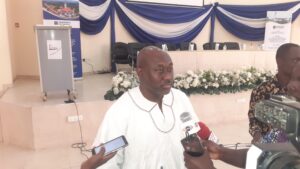University of Ghana 2022/2023 academic fees are legal – Parliamentary Committee on Education

The University of Ghana (UG) says the Parliamentary Select Committee on Education has passed it (UG) for complying with the Fees and Charges Act, 2022 (Act 1080), by charging 15 per cent of fees approved by Parliament.
The University said it had received a formal communication from the Committee confirming that its fees for the 2022/2023 academic year were legal and in line with what had been approved by Parliament.
Professor Gordon Awandare, Pro- Vice Chancellor in charge of Academic and Student Affairs, University of Ghana, said this on Friday in Accra to set the records straight on academic fees and accommodation issues on campus.
He said the University would consider an appeal from the Committee to offer a discount on fees for the current academic year to lessen the burden on students.
The Committee convened a meeting on February 9, 2023, with representatives from the University’s management and student leaders, the National Union of Ghana Students, the Ghana Tertiary Education Commission, and the Ministry of Education to deliberate the matter.
Prof Awandare said the University recognised the current difficult economic situation in the country, and provided flexible fee payment terms for students.
“Students are allowed to register for the first semester upon payment of 50 per cent of their academic facility user fees, with the remaining amount due in the second semester.
“Additionally, students with genuine financial difficulties are encouraged to apply to access support through the University’s Students Financial Aid Office. Management operates an open-door policy and has engaged student leadership on these issues,” he said.
On the accommodation issues, Mrs Emelia Agyei-Mensah, Registrar of the University of Ghana, said the University Council had deliberated and received recommendations from the Residence Board and the Academic Board regarding changes to student residence arrangements due to the repeated incidences of violence on campus.
She reiterated that the new accommodation arrangements were in the interest of all junior members of the University, as the repeated acts of violence posed a great challenge to creating an enabling environment to support teaching and learning.
“The arrangements are also part of efforts to offer more residential places to our level 100 students, and progressively, all the traditional halls (Mensah Sarbah, Commonwealth, Volta, legon and Akuafo halls) will be reserved for level 100 and graduate students only, culminating in a full in-out-out-out policy by 2025/2026,” she said.
The new accommodation arrangement- ejection of continuing students from the Commonwealth and Mensah Sarbah halls led to a number of court cases, including injunctions against the continuation of the implementation of the new residential arrangement.
Eight students have so far been arrested by the Police and put before the courts following clashes over the accommodation issue.
Prof Justice Bawole, Dean, University of Ghana Business School, said the Department was built in 1960 with a total of 192 students but had increased to 2,000, putting pressure on the facility.
He said apart from the salaries of faculty members, the University did not receive any financial assistance to undertake developmental projects, urging the government to do the needful.
Prof Ransford Gyampo, a member of the Communication Team, University of Ghana, urged parents to take keen interest in what their wards did at the University and ensure that they did not become an instrument for other people’s agenda to cause trouble.
He reminded the students about the University’s statutes and student regulations, which provided channels for seeking redress, and that the University would not tolerate any violent conduct.
Source: GNA
